Will you get a gold star from Santa this year? Take my Christmas quiz and find out!

Do you know your PRESENTS from your PRESENCE, and your SLEIGH from your SLAY? Get your grammar gloves on – it’s time for my annual Christmas #confusables quiz!
There’s no prize for getting ten out of ten – just a smug sense of satisfaction and the knowledge that I needed to lie down in a darkened room after typing some of these.
Pick the correct use of the #confusables in the sentences below… I’ll start you with an easy one.
Scroll down for the answers when you’re done. No cheating now!
Question 1
a) “I should have put the turkey in the oven hours ago!”
b) “I should of put the turkey in the oven hours ago!”
Question 2
a) “Oh go on then – I’m not adverse to a mince pie at Christmas.”
b) “Oh go on then – I’m not averse to a mince pie at Christmas.”
Question 3
a) “Whose coming to the Christmas party this year?”
b) “Who’s coming to the Christmas party this year?”
Question 4
a) “Are you inferring I’ve had too much to drink?”
b) “Are you implying I’ve had too much to drink?”
Question 5
a) “Let’s have a glass of sherry while we watch the Queen’s speech.”
b) “Lets have a glass of sherry while we watch the Queen’s speech.”
Question 6
a) “Just look at the amount of presents under the tree this year!”
b) “Just look at the number of presents under the tree this year!”
Question 7
a) “I’ve had so many compliments about my new Christmas dress!”
b) “I’ve had so many complements about my new Christmas dress!”
Question 8
a) “Am I aloud to open one of my presents on Christmas Eve?”
b) “Am I allowed to open one of my presents on Christmas Eve?
Question 9
a) “Too many glasses of fizz at last night’s party have lead to a hangover!”
b) “Too many glasses of fizz at last night’s party have led to a hangover!”
Question 10
a) “Take my advise – sprouts are good for you!”
b) “Take my advice – sprouts are good for you!”
Scroll down for the answers…
Answers
Q1) a
Q2) b
Q3) b
Q4) b
Q5) a
Q6) b
Q7) a
Q8) b
Q9) b
Q10) b
How did you do?
8 to 10: A* student – gold star for you
5 to 7: good effort – could do better
0 to 4: must pay more attention in English lessons*
*future issues of the Clever Copy Club newsletter
(Need to brush up on your #confusables and don’t already receive my monthly email tips and tricks? Sign up here.)
Do you know your PRESENTS from your PRESENCE? Take my fun Christmas spelling quiz to find out!

You don’t often find the words ‘fun’ and ‘spelling’ in the same sentence – but my annual Christmas #confusables spelling quiz is the exception!
Pick the correct spelling in the sentences below, and scroll down for the answers when you’re done. No cheating!
There’s no prize for getting ten out of ten – just the satisfaction that you’re a Clever Copy Club graduate and the knowledge that it caused me actual pain to type some of these!
I’ll start you with an easy one…
Question 1
a) “I wonder who’s doing this year’s alternative Christmas message on Channel 4!”
b) “I wonder who’s doing this year’s alternate Christmas message on Channel 4!”
Question 2
a) “Christmas pudding is my all-time favourite desert.”
b) “Christmas pudding is my all-time favourite dessert.”
Question 3
a) “No peaking at the presents underneath the tree!”
b) “No peeking at the presents underneath the tree!”
Question 4
a) “We enjoyed the school Christmas bizarre this year.”
b) “We enjoyed the school Christmas bazaar this year.”
Question 5
a) “I loved reading Christmas stories aloud to the kids when they were little.”
b) “I loved reading Christmas stories allowed to the kids when they were little.”
Question 6
a) “The carol concert included complementary mince pies!”
b) “The carol concert included complimentary mince pies!”
Question 7
a) “There’ll be trouble if you finish the champagne!”
b) “They’ll be trouble if you finish the champagne!”
Question 8
a) “Have you seen the decorations on the house up the road? They’re not exactly discrete!”
b) “Have you seen the decorations on the house up the road? They’re not exactly discreet!”
Question 9
a) “I hear she brought her turkey from Waitrose this year.”
b) “I hear she bought her turkey from Waitrose this year.”
Question 10
a) “The Christmas Eve party always attracts hoards of people!”
b) “The Christmas Eve party always attracts hordes of people!”
Scroll down for the answers…
Answers
Q1) a
Q2) b
Q3) b
Q4) b
Q5) a
Q6) b
Q7) a
Q8) b
Q9) b
Q10) b
How did you do?
8 to 10: A* student – gold star for you
5 to 7: good effort – could do better
0 to 4: must pay more attention in English lessons*
*future issues of the Clever Copy Club newsletter
(Need to brush up on your #confusables and don’t already receive my monthly email tips and tricks? Sign up here.)
If you enjoyed this post and haven’t already tried 2018 and 2017 Christmas spelling quizzes, give them a go!
Imply or infer: do you know the difference?
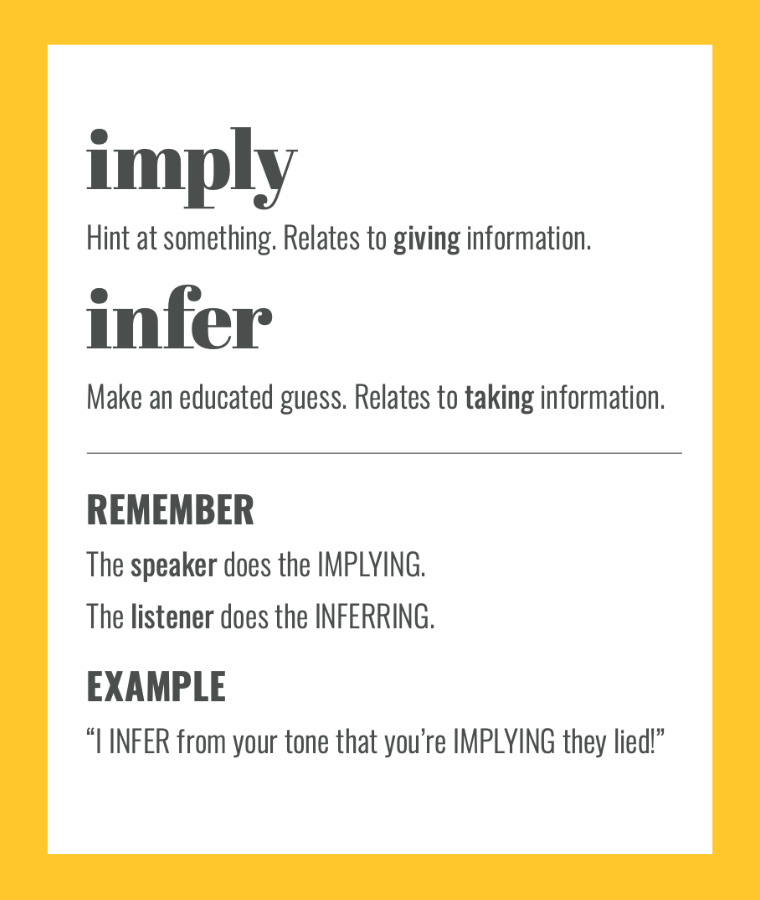
IMPLY and INFER are easy to confuse – especially if you’re new to the English language. But these two words are actually opposites.
Here’s a simple tip to remember the difference between IMPLY and INFER.
When to use IMPLY
IMPLY is a verb that means to hint at something.
IMPLYING is done by the speaker. It relates to giving information.
“Are you IMPLYING that I lied?”
When to use INFER
INFER is a verb that means to make an educated guess from the information presented to you.
INFERRING is done by the listener. It relates to taking information.
“From what you’ve said, I INFER that it wasn’t the first time this had happened?”
Get more tips in The Little Book of Confusables
Fun, memorable spelling and usage tips for 600 commonly confused words, packed into 300+ gorgeous pages for just £11.95. You’ll wonder how you managed without it!
2023 GOLD award winner at the eLit book awards!
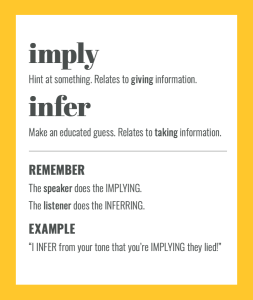
IMPLY or INFER. Excerpt from The Little Book of Confusables by Sarah Townsend.
Formerly vs formally: top spelling tricks to help you decide
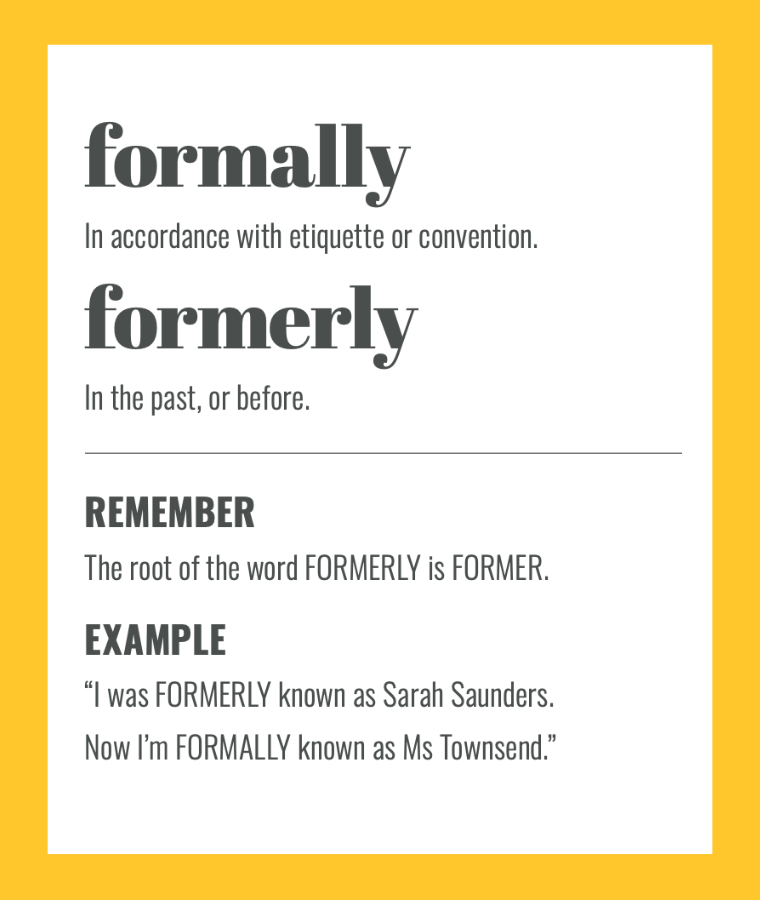
FORMERLY or FORMALLY: which is which? Top spelling tips to remember the difference.
FORMERLY or FORMALLY – they sound the same but their meanings are very different.
So, what do these words mean – and how do you decide which spelling you need? It’s easy.
These simple spelling tips will help you decide whether you need the word FORMERLY or FORMALLY.
Formerly
FORMERLY means something that happened before, or in the past. The clue is in the root of the word: FORMER.
For example:
“I changed my name when I got married. I was FORMERLY known as Sarah Saunders.”
Formally
FORMALLY means in accordance with etiquette or convention. It’s easy to remember when you know it starts with FORMAL.
For example:
“These days, I’m FORMALLY known as Ms Townsend.”
I hope this helps you to remember the difference between FORMERLY and FORMALLY.
Get more tips in The Little Book of Confusables
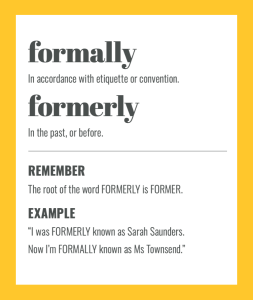
FORMALLY vs FORMERLY. Excerpt from The Little Book of Confusables by Sarah Townsend.
Stationery vs stationary: simple tips to remember the difference
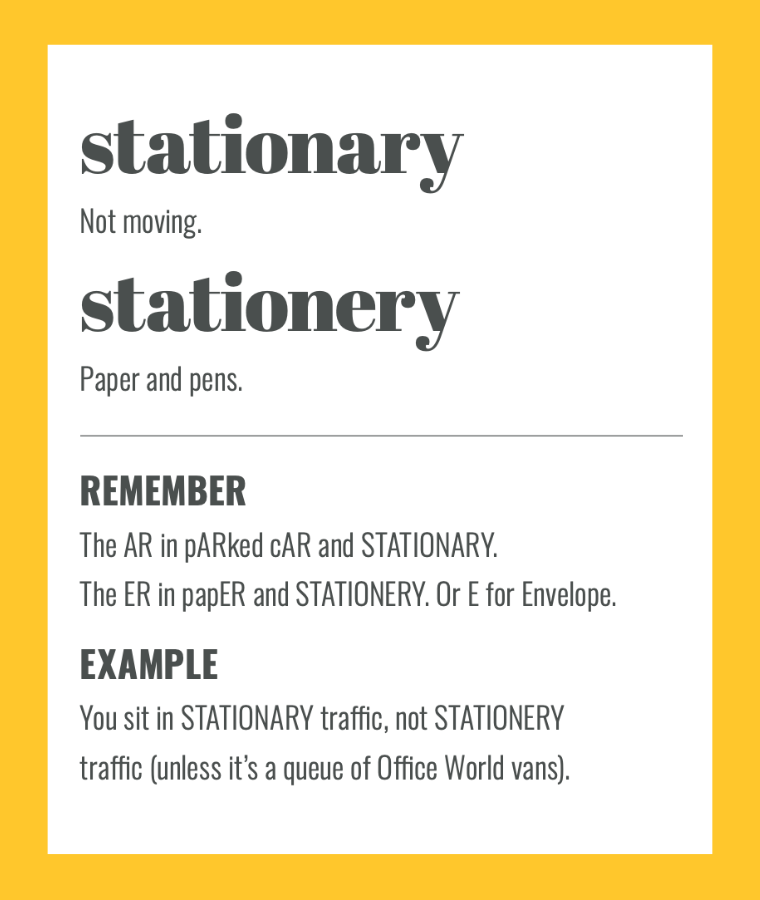
STATIONERY vs STATIONARY: which is which? Tips and tricks to remember the difference
STATIONERY and STATIONARY are commonly confused – and often by people who really should know better. I’ve seen graphic designers and printers offering ‘eye-catching STATIONARY’ more times than I care to remember – most recently in a glossy brochure promoting the services of a Gloucester-based design agency.
It makes me cringe – and I’m not the only one. So, here’s a simple tip to help you remember the correct spelling every time.
STATIONERY is a noun that means the tools used in offices, or for writing – paper and pens, in a nutshell.
You can remember E for Envelopes, or ER in papER.
For example:
“I used to love going back to school after the long summer holidays. It was always a good excuse to buy new STATIONERY.”
STATIONARY is an adjective used to describe something that’s still, or not moving.
Remember the AR in pARked cAR.
For example:
“Sorry I’m late – I was stuck in STATIONARY traffic.”
“Sorry I’m late – I was stuck in STATIONERY traffic” makes no sense. Unless it was a queue of Office World vans.
I hope this simple tip helps you remember the difference between STATIONERY and STATIONARY.
Get more tips in The Little Book of Confusables
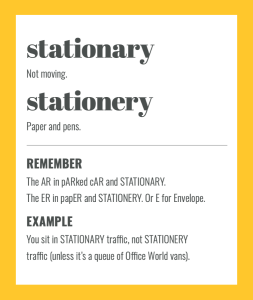
STATIONARY vs STATIONERY. Excerpt from The Little Book of Confusables by Sarah Townsend.









